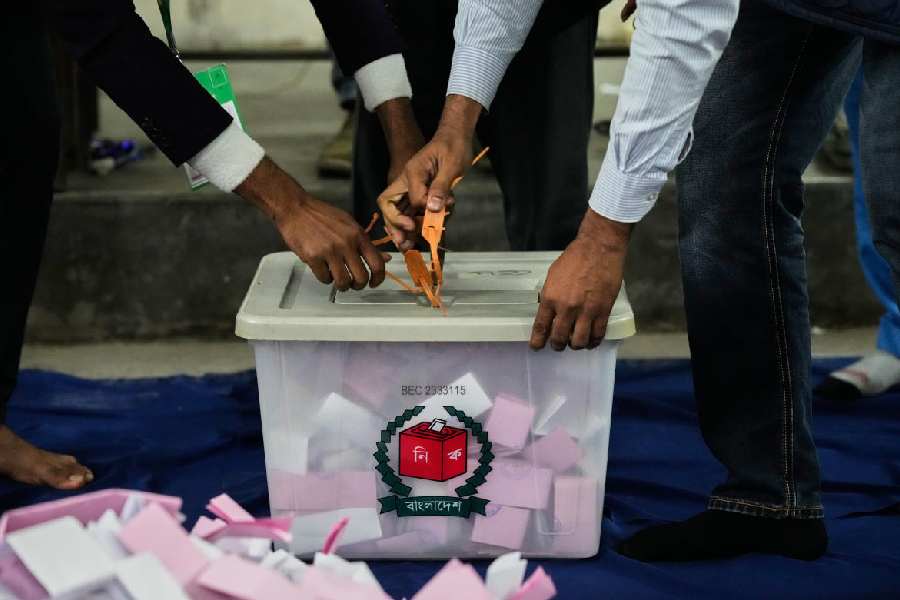 |
| (From left) Goutam Halder, Rudraprasad, Swatilekha and Sohini Sengupta at a rehearsal. A file picture |
Nandikar, that started out under the leadership of legendary actor-director Ajitesh Bandopadhyay, is a year away from its golden anniversary. The group is now a tribe of young theatre workers, led by veteran Rudraprasad Sengupta. On its 49th birth anniversary, Rudraprasad tells t2 about Nandikar’s journey...
When and why was Nandikar started?
Nandikar was set up on June 29, 1960 by a group of students, teachers a clerk and a peon. The agenda was simple: choose the best plays, produce them to your best and perform them wherever possible as many times as you can. Within five years, Nandikar became the busiest theatre group in Bengal. In the Seventies, the group made the mistake of hiring Rangana hall, stupidly hoping to compete with the commercial plays that featured cabaret artistes just two houses away from Rangana. The experiment weakened our moral fibre. It all ended when the owner of Rangana threw us out in 1975.
When did you take over as director?
I took over in 1979. I was forced into my first directorial venture, Antigone, in order to keep the obligations of a central grant, which insisted that the group could show a certain number of new productions. Antigone (with Ajitesh Bandopadhyay as Creon and Keya Chakrabarty as Antigone) turned out to be quite a success. Football hit the headlines all over the country in 1977. Then disaster struck again. Keya died, and Ajitesh and a few others left Nandikar, which was very, very unfortunate for the group because he was far superior as an actor and director.
How has Nandikar evolved over the years?
With time we realised that just painting one’s face and performing for a few days a year was not enough. Performance and production are part of a daily process of learning and teaching how to improve oneself and making society aware how theatre can contribute to daily life. So, we took deliberate steps to involve ourselves in theatre research and propagation. We conducted group interactions with experts from various fields from India and abroad, held workshops with and for streetchildren, slum-dwellers, sex workers, and children with visual and physical disabilities. We have had camps with teachers and guardians of schoolchildren, and training sessions with professionals at IIM Joka and XLRI Jamshedpur.
Is training a vital part of Nandikar’s activities now?
Theatre training, initially a part of the daily Nandikar routine, had been abandoned at a later stage. But there is a need for constant upgrade and exchange of notes between various kinds of theatre workers. We never had formal training. So one of our top priorities was to organise such training, in-house and beyond. Now we have around 180 children, aged between five and 15, training at the Federation Hall on APC Road. They come up with one annual production.
We perform in schools and several schools participate in our projects. All this has helped us financially too. We are the only professional group in Calcutta giving salaries, however nominal, to every member.
How have your wife Swatilekha, daughter Sohini, Goutam and Debshankar Halder contributed?
They are all immensely talented. Swatilekha is an admirable theatre person committed to theatre in mind and heart. Sohini is acting personified. Goutam and Debshankar are gifted. Many other younger actors in our group also put up productions but then sadly everywhere today the group feeling in theatre is on the decline, individuality is taking over and there is a lot of discontent.
What’s coming up next?
We are trying to hold a national meet on children’s theatre in July, where government officials will discuss if theatre can be introduced as a compulsory subject in schools and whether theatre can be used to reach out to children who have no exposure to culture, like slum-dwellers, sex workers, streetchildren.
Which, according to you, is Nandikar’s best production?
Personally, I have a preference for child-friendly theatre. But our best is yet to come.
Should theatre be taught in schools? Tell t2@abpmail.com











